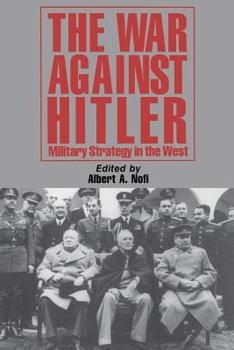The War Against Hitler: Military Strategy in the West
Select Format
Select Condition 
Book Overview
Renowned historian and military commentator Albert A. Nofi brings together for the first time in paperback a series of hard-hitting essays on World War II's most pivotal campaigns; clear, concise and packed with information.
Format:Paperback
Language:English
ISBN:0938289497
ISBN13:9780938289494
Release Date:May 1995
Publisher:Da Capo
Length:288 Pages
Weight:0.85 lbs.
Dimensions:0.6" x 6.0" x 9.0"
Customer Reviews
1 rating
A competent overview of some of the key campaigns in the west.
Published by Thriftbooks.com User , 14 years ago
Mr Nofi has put together a collection of 12 concise, informed essays about the western front of WWII. Five of the essays were written by the author / editor. The topics are presented chronologically and include: The Evolution of Blitzkrieg The Fall of France, 1940 The German Submarine War in the Atlantic The War in North Africa The Invasion and Capture of Sicily The Normandy Invasion Operation Cobra Operation Market-Garden Patton's Lorraine Campaign The Ardennes Offensive Operation Grenade The Ruhr Pocket and the end of the Third Reich These essays are short, averaging less than 25 pages each but contain a lot of pertinent operational information that newcomers to the war could learn from and more experience readers to appreciate. I was considering giving it five stars for there is little factual information to refute but there are several issues that dismay me. I'll just mention a couple but there are others of the same nature. First issue concerns the chapter on Operation Cobra. The original author spends a lot of time discussing German defenses, the preceding air raid, emphasizes Patton's run to Avranches and hardly any time on Collin's forces breaking through the German line which I consider the key element in the operation. He also criticizes Bradley for being too cautious and not following Montgomery's counseling. I disagree with the author's priorities and his criticism of Bradley. There tended to be more criticism, though not blatant, of the American commanders than the British throughout the entire book which was bothersome. In the Sicily campaign, the author skimmed over the difficulty in the planning stage and the domination of the process by Alexander and later Montgomery over the Americans. Alexander had already developed a creditable plan but Montgomery didn't like and went about to have his way, giving the British the prominent role. The author praises the new plan as being better and more cautious. The plan wasn't better and the results proved it. It took over twice as long to capture the island as expected, Montgomery's leadership was questionable and the entire Axis forces evacuated to Italy with all of its weaponry. The author praised the Germans for their escape but didn't blame Montgomery for allowing them to escape. Speaking of Italy, there is no discussion on the Italian campaign which I find to be a glaring omission. The discussion of the Falaise Gap was also disturbing. The author after briefly explaining the circumstances, gave praise to Montgomery, Bradley and Patton for their handling in closing the gap. I find that alarming for in my opinion, Montgomery, Bradley and the Supreme Commander's action lacked focus, determination and were left wanting. There were several other issues of contention but I'll stop here. These essays are very brief and it would be unfair of me to criticize too much for many key facts were presented about these important campaigns. Most of my remarks dealt with the author's comments and






